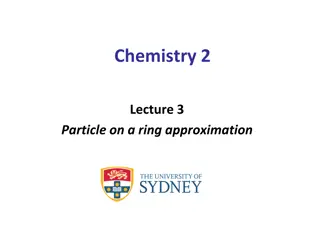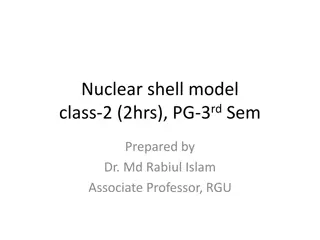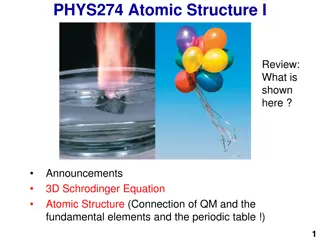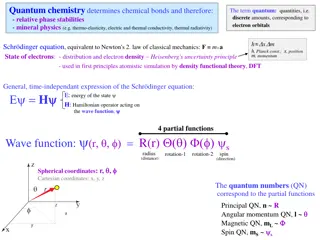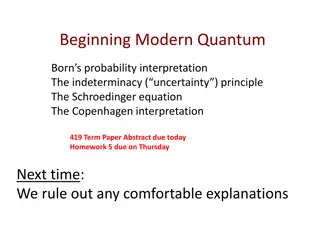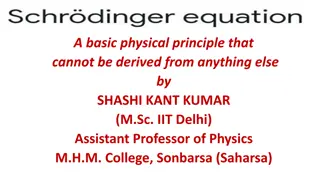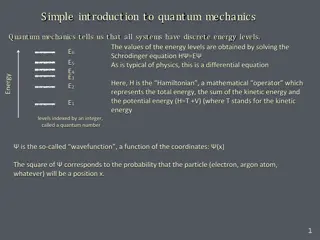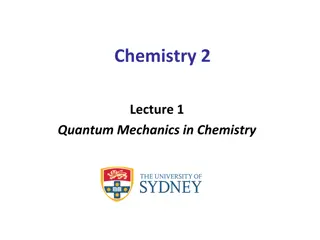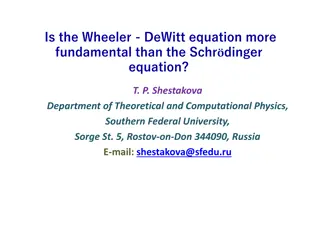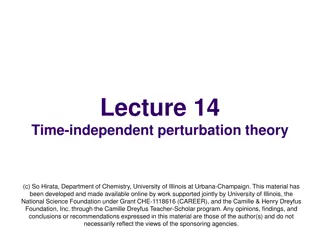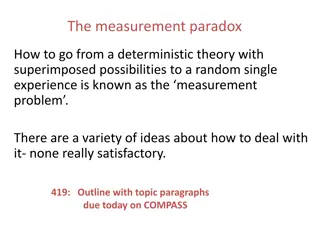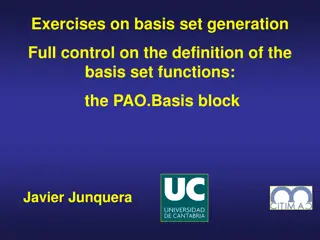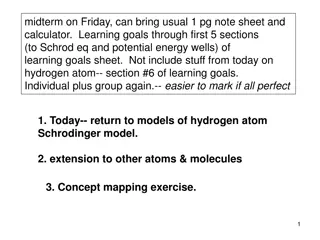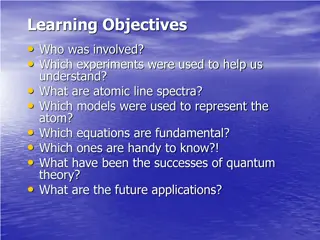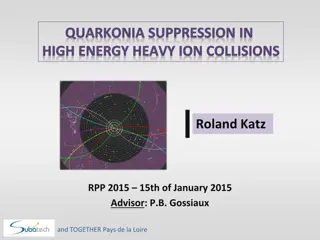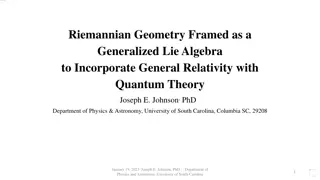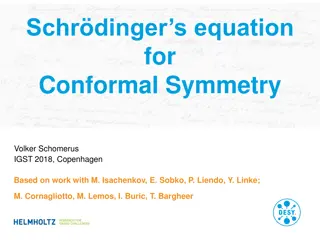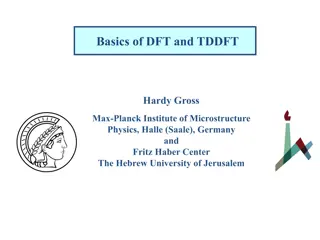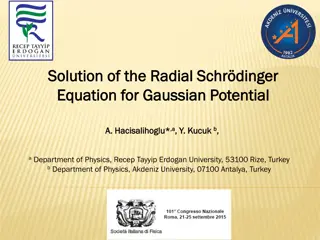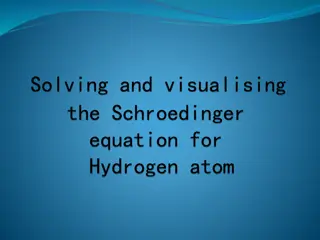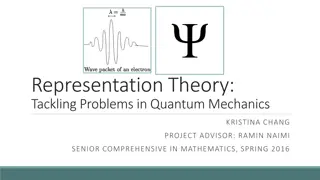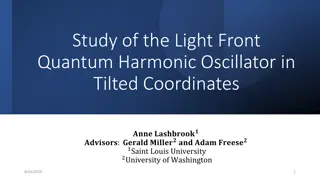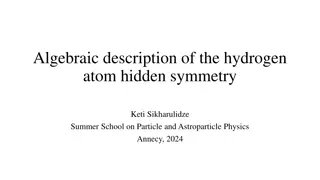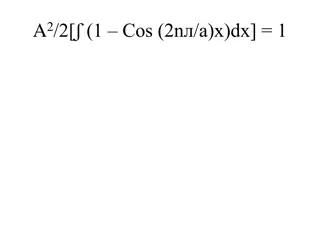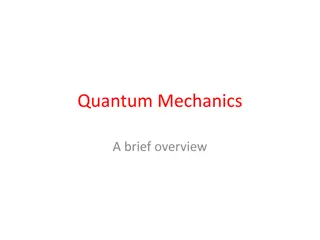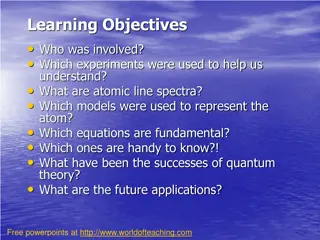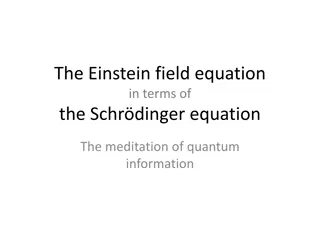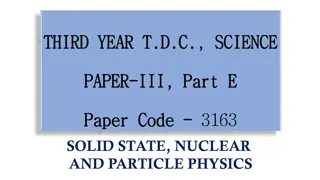Operator Formalism in Quantum Mechanics
Dive into the world of quantum mechanics with Dr. N. Shanmugam as he explains the role of operators, their significance in quantum mechanics, and how they are used to determine physical quantities through expectation values. Explore concepts such as the Hamiltonian operator, time-independent Schrodi
3 views • 49 slides
Particle-on-a-Ring Approximation in Chemistry
Delve into the fascinating world of the particle-on-a-ring approximation in chemistry, exploring concepts like quantum quantization of energy levels, De Broglie approach, Schrödinger equation, and its relevance to the electronic structure of molecules. Discover how confining particles to a ring lea
3 views • 23 slides
Theoretical Derivation and Application of Nuclear Shell Model in Quantum Physics
The nuclear shell model, a fundamental concept in quantum physics, is explained in detail using Schrodinger wave equations and spherical coordinates. The model describes the behavior of nucleons in atomic nuclei based on energy values, quantum numbers, and shell closure principles. Spin-orbit intera
4 views • 14 slides
Theoretical Derivation and Application of Nuclear Shell Model in Quantum Physics
Brought to you by Dr. Md. Rabiul Islam, Associate Professor at RGU, this presentation delves into the theoretical derivation of the shell model using Schrodinger wave equations in the presence of specific potentials. Exploring the solutions for the wave equation and explaining the role of quantum nu
5 views • 14 slides
Quantum Mechanics in Atomic Structure
Exploring the connection between quantum mechanics and the fundamental elements of the periodic table, this material delves into the Schrödinger equation, quantization of angular momentum and electron spin, and the implications on atomic structure. The content covers writing the Schrödinger equati
5 views • 32 slides
Quantum Chemistry and Electron Orbitals
Quantum chemistry plays a key role in determining chemical bonds, phase stabilities, and mineral physics through the study of electron orbitals, quantum numbers, and energy levels. This involves concepts such as the Schrödinger equation, quantum quantities, and the uncertainty principle. The arrang
5 views • 31 slides
Unraveling the Enigmatic World of Quantum Mechanics
Delve into the perplexing realm of modern quantum mechanics, exploring concepts such as Born's probability interpretation, the indeterminacy principle, the Schrödinger equation, and the fascinating duality of particle-wave behavior. Gain insights into the transformative impact of quantum theory on
6 views • 16 slides
Fundamental Physics Principles Explored by Schrodinger and De Broglie
Shashi Kant Kumar dives into the groundwork laid by notable physicists such as Schrodinger and De Broglie, highlighting the fundamental principles of quantum mechanics. The evolution of Schrodinger's equation, the Nobel Prize-winning collaborations, and the application of wave mechanics to atomic st
0 views • 13 slides
Introduction to Quantum Mechanics: Energy Levels and Schrödinger Equation
Quantum mechanics reveals that all systems possess discrete energy levels, determined by solving the Schrödinger equation where the Hamiltonian operator represents total energy. In a particle-in-a-box scenario, potential energy is infinite outside the box. The Schrödinger equation simplifies to a
16 views • 12 slides
Quantum Mechanics in Chemistry Lecture 1 Overview
Explore the fundamentals of quantum mechanics in chemistry, focusing on electron behavior, orbital solutions, bonding, and interactions. Learn about the role of different orbitals, resonance, and orbital mixing in the Schrödinger equation to understand molecular structure and behavior.
3 views • 24 slides
Journey Through Science: Labs, Spectra, and Mentors
Explore a visual journey through various scientific labs, equipment, and notable personalities in the field of chemistry, including Giauque Low Temperature Lab at UC Berkeley, advanced measuring systems, and insights into the lives of renowned scientists like E. Bright Wilson and Doc Fong. Witness t
0 views • 13 slides
Fundamental Comparison: Wheeler-DeWitt vs. Schrödinger Equation
The debate on whether the Wheeler-DeWitt equation is more fundamental than the Schrödinger equation in quantum gravity remains inconclusive. While the Wheeler-DeWitt equation presents an elegant formulation, the Schrödinger equation is essential in specific cases. The issue of time and coordinate
1 views • 6 slides
Time-Independent Perturbation Theory in Quantum Mechanics
Perturbation theory is a powerful tool in solving complex physical and mathematical problems approximately by adjusting solutions from a related problem with known solutions. This theory allows for more accurate approximate solutions by treating the difference as a small perturbation. An example inv
5 views • 19 slides
Unraveling the Quantum Measurement Paradox
The measurement paradox delves into the challenge of transitioning from deterministic theories with superimposed possibilities to random single experiences. Various ideas attempt to address this issue, yet none are entirely satisfactory. Explore concepts like the collapse of the wavefunction, Schrö
4 views • 22 slides
Basis Set Generation in Computational Chemistry
Detailed explanation and control over defining basis set functions, species labels, number of shells, basis set generation procedures, and solving the Schrödinger equation for ion generation. Explore schemes for generating multiple basis sets and the impact of extra charge on orbital localization i
4 views • 17 slides
Quantum Chemistry Learning Goals and Concepts
This content covers the learning goals and concepts of quantum chemistry leading up to the Schrodinger equation and potential energy wells, excluding the material on the hydrogen atom introduced later. It explores models of the atom, including observations of atomic spectra, the Bohr model, de Brogl
4 views • 22 slides
Quantum Theory and Key Figures in Physics
Explore the evolution of quantum theory through the perspectives of renowned physicists such as Albert Einstein, Niels Bohr, Werner Heisenberg, Erwin Schrödinger, Prince Louis de Broglie, and Max Planck. Learn about atomic line spectra, fundamental equations, and models used to represent the atom.
3 views • 23 slides
Classical Mechanics and Quantum Theory: A Comprehensive Overview
Explore the fundamental principles of classical mechanics and quantum theory through the insightful teachings of Dr. R. R. Mistry. From the mechanics of particles to the wave-particle duality, delve into topics such as conservation laws, Schrodinger's equation, and the origins of quantum theory. Gai
4 views • 22 slides
Quarkonia Suppression in High Energy Heavy Ion Collisions by Roland Katz
Investigating the phenomenon of Quarkonia suppression in high energy heavy ion collisions, Roland Katz explores the properties of Quark Gluon Plasma and the behavior of quarks and gluons under extreme conditions. The study delves into the dynamics using the Schrödinger-Langevin equation, highlighti
0 views • 23 slides
Incorporating General Relativity into Quantum Theory through Riemannian Geometry
Framing Riemannian Geometry as a Generalized Lie Algebra to combine General Relativity with Quantum Theory. The proposal extends Heisenberg Algebra to incorporate a more general geometry, allowing for a function of position in commutator relationships. The discussion covers historical developments,
4 views • 50 slides
Schrödinger's Equation for Conformal Symmetry
Volker Schomerus presented on Schrödinger's equation for conformal symmetry at IGST 2018 in Copenhagen. The talk was based on collaborative work with M. Isachenkov, E. Sobko, P. Liendo, Y. Linke, M. Cornagliotto, and M. and explored the implications of conformal symmetry in quantum mechanics.
0 views • 20 slides
Basics of DFT and TDDFT
Delve into the fundamentals of Density Functional Theory (DFT) and Time-Dependent Density Functional Theory (TDDFT) through the works of Hardy Gross, a prominent researcher at Max-Planck Institute of Microstructure Physics. Explore the Hamiltonian of condensed matter systems, including atoms, molecu
3 views • 36 slides
Radial Schrödinger Equation Solution for Gaussian Potential
Energy eigenvalues and eigenfunctions in quantum mechanics are studied through the exact solution of the radial Schrödinger equation for Gaussian potentials, using the Asymptotic Iteration Method. The method's efficiency in solving wave equations for different potentials is highlighted, with a focu
2 views • 23 slides
Solving Time-Independent Schrödinger Equation in Spherical Coordinates
Reformulating the Schrödinger equation in spherical form involves separating variables and solving for energy, angular, and radial functions. Energy spectrum is crucial in quantum mechanics, obtained by solving the radial equation with boundary conditions. Constants are converted to atomic units fo
12 views • 26 slides
Quantum Mechanics
Quantum mechanics delves into the behavior of atomic systems, emphasizing wave-particle duality through Schrödinger's wave equation. Wave functions provide insights into probability density, ensuring the particle's presence across positions. Normalizing the wave function is crucial for maintaining
3 views • 17 slides
Quantum Mechanics in Your Face
This content provides a concise overview of key concepts in quantum mechanics, covering topics like the GHZ effect, Schrödinger's cat, observables, and measurement probabilities. It presents fundamental principles in a clear and accessible manner, referencing notable works and discussing interpreta
1 views • 20 slides
Inadequacies and Origins of Quantum Mechanics
Classical physics fails in the atomic realm, leading to the development of quantum mechanics. Max Planck's introduction of energy quanta and subsequent theories by Heisenberg and Schrödinger revolutionized our understanding of atomic phenomena.
5 views • 15 slides
Representation Theory in Quantum Mechanics: Tackling Problems with Symmetry
Dive into the world of quantum mechanics through the lens of representation theory, exploring solutions to Schrödinger equations, stationary states, and intrinsic symmetry. Discover how to translate quantum problems involving symmetry groups using linear algebra and group homomorphisms.
2 views • 34 slides
Computational Chemistry Methods
The field of computational chemistry focuses on simulating chemical systems to provide detailed information at an atomic level. This involves two main methodological families: quantum chemical methods and molecular mechanics. Quantum chemistry methods explicitly consider electrons, while molecular m
1 views • 21 slides
Study of the Light Front Quantum Harmonic Oscillator in Tilted Coordinates
This study delves into the Light Front Quantum Harmonic Oscillator in Tilted Coordinates, exploring the motivation, wavefunction, and Hamiltonian matrix approximation. It discusses the challenges in obtaining analytic or perturbative solutions in nuclear physics and showcases the Light Front Formali
3 views • 21 slides
Algebraic Description of Hydrogen Atom Hidden Symmetry and Energy Spectrum Formula
Delve into the fascinating world of the hydrogen atom’s hidden symmetry and the derivation of its energy spectrum formula through solving Schrödinger's differential equation. Uncover the connection between accidental degeneracy and hidden symmetries, brought to light by Pauli. Explore Laplace-Run
7 views • 17 slides
Evolution of Wave-Functions in Potentials
The Time Dependent Schrödinger Equation illustrates the evolution of wave-functions in potentials, emphasizing conservation of energy. Learn about time-independent and time-dependent solutions, superposition of states, and more with interactive simulations.
1 views • 8 slides
Quantum Mechanics: Particle Behavior in Three-Dimensional Space
Explore how particles behave in three-dimensional boxes through the time-independent Schrodinger equation. Understand the calculations of probabilities and energy levels for different scenarios. Dive into the mathematical representations and implications in quantum mechanics.
1 views • 179 slides
Quantum Mechanics and the Schrödinger Equation
Explore the fundamentals of quantum mechanics with a focus on the Schrödinger equation, wave functions, probability density, and normalization conditions. Dive into the concept of complex conjugates, potential energy in a box, and the derivation of wave functions in this informative guide.
2 views • 18 slides
Insights into Quantum Mechanics and Its Impact on Modern Physics
Delve into the fascinating world of quantum mechanics through an overview covering topics such as classical mechanics, wave-particle duality, atomic spectra, and the Schrodinger equation. Explore the foundational principles and applications that have revolutionized our understanding of the physical
3 views • 27 slides
Exploring Quantum Theory and Atomic Spectra through Key Figures
Delve into the world of quantum theory and atomic line spectra by learning about the key figures involved such as Albert Einstein, Niels Bohr, Werner Heisenberg, Erwin Schrödinger, Prince Louis de Broglie, and Max Planck. Discover the experiments, models, equations, and successes that have shaped o
1 views • 23 slides
Einstein Field Equation and Schrödinger Equation Relationship
Explore the connection between the Einstein field equation and the Schrödinger equation through the lens of quantum information and qubits. This concept delves into the deformation of spaces and the transition from future to past in a quantum framework.
3 views • 51 slides
Crystallography and Quantum Mechanics in Electron Behavior
Explore the connection between crystallography and quantum mechanics in understanding electron behavior within materials. Discover how the free electron model and Schrödinger equation play crucial roles in predicting electron movements and properties, ultimately shedding light on fundamental princi
3 views • 19 slides
Quantum Mechanics Quiz: Particle in a Box
Test your knowledge on quantum-mechanical systems, Schrödinger's equation, and particle confinement in a 3-D box with this challenging quiz. Explore topics like absorbed photons, excited states, degenerate energies, and more.
1 views • 5 slides
Evolution of Atomic Models: From Democritus to Bohr
Explore the timeline of atomic models from Democritus to Bohr, including key contributions by Dalton, Rutherford, Schrodinger, and more. Learn about Bohr's model and postulates, orbital radius, energy level diagrams for hydrogen, and wavelengths of the Balmer series.
3 views • 8 slides

